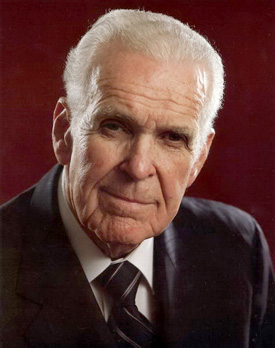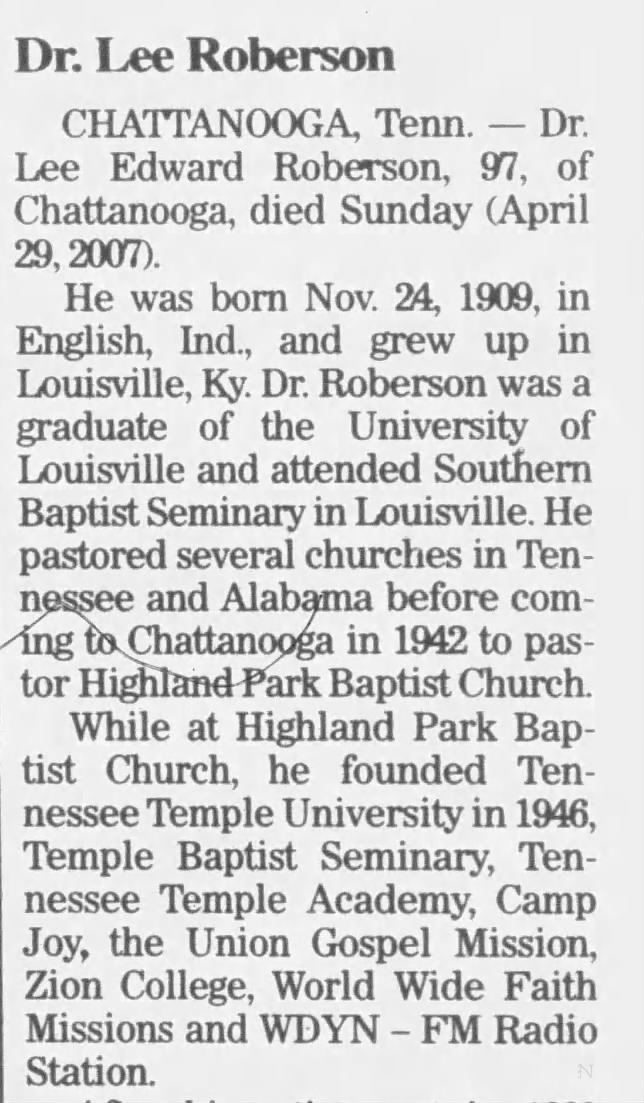Lee Edward Roberson
“The greatest faith is born in the hour of despair. When we can see no hope and no way out, then faith rises and brings the victory.”
(Lee Edward Roberson)
Early Life and Formative Years
Lee Edward Roberson was born November 24, 1909, near English, Indiana, in a modest two-room log cabin. His parents, Charles E. and Dora (Sego) Roberson, later moved the family in 1911 to a farm near Louisville, Kentucky, where his father worked in several trades to support the family.
At the age of 14, in 1923, Lee Roberson was converted at the Cedar Creek Baptist Church through the witness of his Sunday-school teacher Mrs. Daisy Hawes, and at the same time his parents professed faith and were baptized.
His education included Louisville Male High School (earning a diploma in public accounting) and Fern Creek High School, followed by college studies at Old Bethel College, the University of Louisville (majoring in history) and later seminary training at the Southern Baptist Theological Seminary in Louisville under A. T. Robertson.
Entering Ministry and Early Pastoral Work
Roberson’s early ministry began with a pastorate in Germantown, Tennessee, while still in college. In 1932 he accepted a call to the Temple Baptist Church in Greenbrier, Tennessee, where he emphasized the Second Coming and evangelistic activity. After three years there he transitioned into full-time evangelistic work in 1935 with the Birmingham Baptist Association in Alabama, conducting numerous revival meetings.
On October 9, 1937, he married Caroline Allen; together they would have four children, though one infant daughter, Joy, died in infancy and her passing would later inspire a ministry to youth.
Highland Park Baptist Church & Institutional Foundations
In November 1942, Roberson became pastor of the Highland Park Baptist Church in Chattanooga, Tennessee. Under his leadership the church grew enormously, in the 1950s and 60s becoming one of the largest independent Baptist congregations in America.
In 1946 Roberson founded Tennessee Temple University (initially Zion College) and in 1948 established the seminary that would become Temple Baptist Seminary. His vision was to raise up trained Christian workers—pastors, missionaries, teachers—rooted in Scripture and evangelism.
Roberson also pioneered other ministries: a radio ministry (WDYN), a city-wide bus ministry for Highland Park, and in 1946 he established Camp Joy in Harrison, Tennessee, named in memory of his infant daughter and dedicated to youth outreach.
Ministry Philosophy & Influences
Roberson placed strong emphasis on soul-winning, regular church attendance and disciplined Christian life. One of his early slogans was “Three to Thrive”—referring to regular attendance at the three main church services: Sunday morning, Sunday evening, and Wednesday night. He vehemently promoted verse-by-verse preaching of the Bible (particularly the King James Version), personal evangelism and discipleship.
Roberson’s priorities reflected his conviction that large institutional growth was meaningful only when built upon committed discipleship and a church culture of evangelism and training. He once noted that when he took a year off from the pulpit due to voice problems, the work continued—that taught him that success depended not just on him but on what God could do through the people.
Impact and Growth
During his long tenure at Highland Park (1942–1983), Roberson led the church through major growth. At certain points the church claimed membership in the tens of thousands and reported a large number of professions of faith—claims that underscore the scale of his outreach. Tennessee Temple University and the seminary trained many pastors, missionaries and Christian workers who carried Roberson’s vision into other churches and fields.
Camp Joy became a widely-known Christian summer camp which ministered to youth and shaped generations of young believers for service. These institutions formed the enduring structural legacy of Roberson’s ministry.
Later Years and Legacy
Roberson preached his final service as senior pastor of Highland Park on April 27, 1983. Although he stepped down from the pastorate, he remained active in evangelistic and conference ministry for many years thereafter. He died April 29, 2007, in Chattanooga at the age of 97.
His legacy can be measured in various ways: the many Christian workers trained through his institutions; the thousands who professed faith through Highland Park during his leadership; the culture of youth outreach through Camp Joy; and the churches influenced by his insistence on Scripture-based preaching and evangelism.
Practical Lessons from Roberson’s Life
- Commitment to Scripture – Roberson’s emphasis on Bible-centered preaching and training reminds us that institutional expansion must be accompanied by strong doctrinal and spiritual foundations.
- Evangelism and discipleship go together – Roberson believed that reaching people for Christ required follow-up, training, and active involvement in church life—not simply large numbers.
- Institutional vision with ground-level ministry – Founding a university, seminary and summer camp alongside pastoral ministry shows how vision can be both broad (training many) and deep (touching individual lives).
- Longevity and stability matter – Roberson’s decades of consistent service in one place provided the soil for deep roots and long-term influence.
- Youth ministry is pivotal – The founding of Camp Joy in memory of his daughter underscores his conviction that investing in young people has lasting significance.
Conclusion
Lee Edward Roberson’s life and ministry reflect a traditional, deeply Christian approach—rooted in the Gospel, committed to Scripture, dedicated to evangelism, and sustained by faithful service. His legacy remains visible in churches, educational institutions, and youth ministries shaped by his leadership and vision. For anyone seeking to understand how one pastor and evangelist can make a long-term impact, Roberson’s example stands as a testament to perseverance, vision and the power of trusting God to build through faithful service.
_____
Image Source/Credit (in order):
- Lee Roberson – Bhamwiki. www.bhamwiki.com/w/Lee_Roberson.
- Newspapers.com, Kingsport Times-News, May 2, 2007, https://www.newspapers.com/article/kingsport-times-news/191133723/
Related
Sorry, no records were found. Please adjust your search criteria and try again.
Sorry, unable to load the Maps API.

